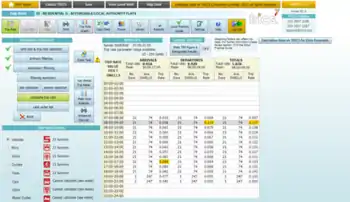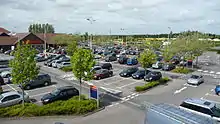TRICS
TRICS (Trip Rate Information Computer System) is a database of trip rates for developments used in the United Kingdom for transport planning purposes,[1] specifically to quantify the trip generation of new developments.[2]

The TRICS interface
The TRICS Consortium describes TRICS as follows:
- TRICS is the system that challenges and validates assumptions about the transport impacts of new developments. It is the national system of trip generation analysis, a large database of inbound & outbound transport surveys covering a wide variety of development types.
Release history
The database was established in 1989[3] by six county councils in South East England county councils (Dorset, East Sussex, Hampshire, Kent, Surrey and West Sussex). It is now maintained by TRICS Consortium Ltd, based in Barnet, London.
TRICS 7, a major update, was released in late 2013.
Developments

Developments such as supermarkets generate multi-modal trips. TRICS contains trip generation rates for different categories of development.
TRICS includes the following development categories:
SAM for Travel Plans
TRICS have also developed SAM (Standard Assessment Methodology),[4] a system to measure the effectiveness of travel plans.
References
- "TRICS® the System".
- Transport for London, https://www.tfl.gov.uk/info-for/urban-planning-and-construction/travel-plans/monitoring-travel-plans
- West Sussex County Council, https://www.westsussex.gov.uk/roads-and-travel/information-for-developers/pre-application-advice-for-roads-and-transport/
- http://www.trics.org/sam.aspx
This article is issued from Wikipedia. The text is licensed under Creative Commons - Attribution - Sharealike. Additional terms may apply for the media files.